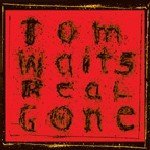
Tom Waits Real Gone
(Anti)
Has any popular artist been as culturally relevant longer than Tom Waits? From his introduction as sad sap piano man, through his flirtations with beat poetry and jazz chord progressions and concluding with his recent stints as junkyard bluesman and carnival barker, Waits has run the reinvention gamut more often than anyone not named David Bowie. And, with a large portion of the press pointing out how this will be his first album completely devoid of piano, it's likely that many fans were expecting another change. However, Real Gone sounds more like a sequel to the Grammy-winning Mule Variations. Which, all things considered, is high praise indeed.
Waits makes more use of current technology in this one, utilizing turntables on a number of tracks, adding another dimension to his already idiosyncratic ideas about percussion. Traditionalists might point to this as a final shot at modern relevancy, but then, traditionalists probably lost track of Waits a decade ago. Besides, he had used the same set-up on Mule Variations' Filipino Box Spring Hog, a long-time fan favourite. Much of the percussion is none other than Waits' vocals, recorded in his bathroom and constructed into bluesy songs regarding trains, loss, politics, and death. You know, the usual.
Present also is avant-garde guitar hero Marc Ribot, who helped to make past Waits' albums such as Rain Dogs and Swordfishtrombones into two of the finest collections of music ever laid on tape.
That means Waits' trademark raspy bark is pushed even further into the forefront, snaking in and out of the mix like an unholy thing left in a graveyard. The tone of the album becomes evident with album openers Top of The Hill - which sounds like it was recorded in a breathless rush - and Hoist That Rag, which immediately places itself into the pantheon of the artist's finest tunes, putting an R&B shuffle behind sentiments that could easily be placed into context as a statement on the war in Iraq, but are vague enough that it could just as easily be about Union soldiers in 1863.
All this steam is lost, however, with the following song Sins of My Father, which could have been an outtake from any of his past four albums, but shoots itself in the foot by repeating a generic blues progression over and over for over 10 minutes. The rest of the album is disappointingly hit or miss, much more so than any of his previous work. Songs like Metropolitan Glide, Don't Go into that Barn, and Circus rank as some of his worst efforts. Conversely, cuts like Trampled Rose and Make It Rain are amongst his finest. Shake It might as well be culled straight from the Stones' Exile On Main Street, one-upping them with talk of casinos and violence over a blues stomp so dirty you'll think it's Bill O'Reilly on the phone. Plus, it doesn't get any better than a 60 year old man howling "shake it baby," during the chorus. The album ends on a sombre note with Day After Tomorrow, a song with lyrics constructed as a letter back home from a young soldier in Iraq, complete with sobering lines like "I'm not fighting for justice/I'm not fighting for freedom/I am fighting for my life."
Despite the unevenness of the album, it still demonstrates the depth and power of Waits' songwriting ability. Real Gone showcases his ingenuity (even if it as on a smaller scale when compared to his ever growing catalogue) while staying true to his muse - constantly shifting, pushing him past musical boundaries, his guttural musings remaining austere, ethereal, and occasionally heartbreaking.
20 January, 2005 - 00:00 — Brian Graham